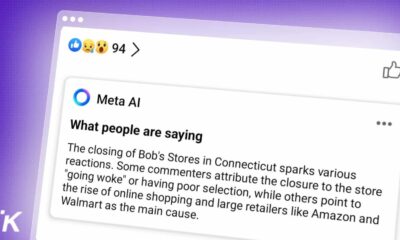New Florida law bans some teens from having social media accounts
The measure bans most Florida teens from having social media accounts without parental consent.

Just a heads up, if you buy something through our links, we may get a small share of the sale. It’s one of the ways we keep the lights on here. Click here for more.
Florida has become the first state in the country to ban social media accounts for most teenagers.
The law, signed by Florida Governor Ron DeSantis on Monday, requires social media platforms like
It also requires parental consent before social media platforms allow teens to use their services.
Social media platforms that fail to remove accounts under the law could have to fork over $10,000 to minors, as well as $50,000 in legal fees per violation.
Teens can still sign up
At a press conference, DeSantis said the purpose of the bill wasn’t to “ban” minors from using social media — they can still sign up for an account if they have the explicit consent of their parents — but rather to limit the “very difficult terrain we have now with raising kids,” which he attributed to struggles caused by social media platforms.
The measure is a less restrictive version of a bill considered by Florida lawmakers earlier in the year, which would have banned social media accounts for anyone under the age of 17.
That version of the bill would have also required Florida residents to submit a photo ID to a social media platform before an account could be created.
When will the law change?

The law — which doesn’t take effect until next January — is already facing opposition from public interest groups, and legal challenges are expected.
Meta, the parent company of Facebook and Instagram, is one of several that have voiced opposition to the bill. NetChoice, which counts tech companies like Amazon, Google,
“We’re disappointed to see Gov. DeSantis sign onto this route. There are better ways to keep Floridians, their families and their data safe and secure online without violating their freedoms.”
-Carl Szabo, Vice President and General Counsel, NetChoice
There could be challenges ahead

NetChoice is the most likely plaintiff to bring a legal challenge to the law: The organization sued Florida and its attorney general, Ashley Moody, over a measure that prohibits social media companies from removing accounts associated with political candidates in the state.
The lawsuit made its way to the Supreme Court last month and is expected to be decided this summer.
Paul Renner, the Speaker of Florida’s House of Representatives, said the state would welcome a lawsuit on the social media ban for teenagers, likening certain harms caused by social media to “trafficking.”
“We’re going to beat them, and we’re never ever going to stop.”
– Paul Renner, Florida House of Representatives
Another year, another law
The legislative effort in Florida is the latest involving a government official or body targeting a social media platform over perceived harm to young users.
Last year, lawmakers in Montana passed a bill that banned app stores from making TikTok available to download and install on phones, tablets, and other devices.
The ban did not prohibit residents or businesses from using
Earlier this month, U.S. House lawmakers passed a measure that would require
A similar proposal is pending in the U.S. Senate; President Biden has signaled his intent to sign the measure into law if it reaches his desk before Congress recesses for the summer.





























